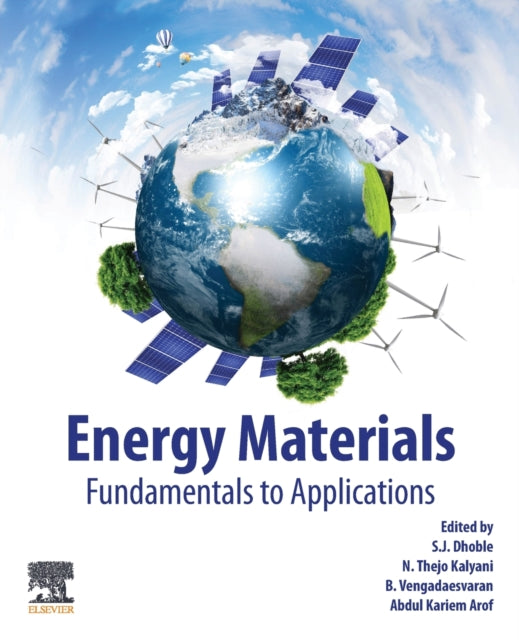Shulph Ink
Energy Materials: Fundamentals to Applications
Energy Materials: Fundamentals to Applications
YOU SAVE £10.94
- Condition: Brand new
- UK Delivery times: Usually arrives within 2 - 3 working days
- UK Shipping: Fee starts at £2.39. Subject to product weight & dimension
Bulk ordering. Want 15 or more copies? Get a personalised quote and bigger discounts. Learn more about bulk orders.
Couldn't load pickup availability
- More about Energy Materials: Fundamentals to Applications
Solar cells, Li ion/ Li-air/Li-S batteries, fuel cells, and their energy storage mechanisms are key technologies for converting solar energy into usable electricity. Solar cells convert sunlight into electricity, while Li ion/ Li-air/Li-S batteries store energy in the form of lithium ions. Fuel cells convert hydrogen or methane into electricity. The efficiency, cost, and durability of these technologies are important factors for their widespread adoption.
Format: Paperback / softback
Length: 628 pages
Publication date: 20 August 2021
Publisher: Elsevier Science Publishing Co Inc
Solar cells, lithium-ion/li-air/li-s batteries, fuel cells, and their energy storage mechanisms are all essential components of renewable energy systems. Solar cells convert sunlight into electricity, while lithium-ion batteries store energy for portable devices. Fuel cells convert hydrogen or methane into electricity, while energy storage mechanisms such as batteries and capacitors store excess energy for later use.
Solar cells, lithium-ion/li-air/li-s batteries, fuel cells, and their energy storage mechanisms are pivotal components of renewable energy systems. Solar cells harness the power of sunlight to generate electricity, while lithium-ion batteries store energy for portable devices. Fuel cells convert hydrogen or methane into electricity, and energy storage mechanisms such as batteries and capacitors ensure the efficient utilization of excess energy.
The fundamental phenomenological theories underpinning solar cells, lithium-ion/li-air/li-s batteries, fuel cells, and their energy storage mechanisms are crucial in understanding their operation and evaluation. Solar cells, for instance, rely on the photovoltaic effect, where sunlight excites electrons in a semiconductor material, resulting in the generation of an electric current. Lithium-ion batteries, on the other hand, store energy by reversibly intercalating lithium ions into an anode or cathode material. Fuel cells, conversely, utilize an electrochemical reaction to convert hydrogen or methane into electricity.
In addition to their device operation and evaluation, the properties of various energy materials are essential considerations. Solar cells, for example, require materials with high photon absorption coefficients, low electrical resistance, and good thermal stability. Lithium-ion batteries require materials with high energy densities, high ionic conductivities, and good cycle stability. Fuel cells, on the other hand, require materials with high catalytic activity, high thermal conductivity, and good corrosion resistance.
The development of efficient and sustainable renewable energy systems requires a deep understanding of the fundamental phenomenological theories and properties of energy materials. Researchers and engineers are continually exploring new materials and technologies to improve the performance and efficiency of solar cells, lithium-ion/li-air/li-s batteries, fuel cells, and their energy storage mechanisms. This research has the potential to revolutionize the way we generate and use energy, reducing our dependence on fossil fuels and mitigating the impact of climate change.
In conclusion, solar cells, lithium-ion/li-air/li-s batteries, fuel cells, and their energy storage mechanisms are essential components of renewable energy systems. These devices rely on fundamental phenomenological theories and the properties of various energy materials to convert sunlight, hydrogen, or methane into electricity. The development of efficient and sustainable renewable energy systems requires a deep understanding of these theories and materials, and ongoing research and development efforts are crucial in achieving this goal.
Weight: 1256g
Dimension: 192 x 235 x 34 (mm)
ISBN-13: 9780128237106
This item can be found in:
UK and International shipping information
UK and International shipping information
UK Delivery and returns information:
- Delivery within 2 - 3 days when ordering in the UK.
- Shipping fee for UK customers from £2.39. Fully tracked shipping service available.
- Returns policy: Return within 30 days of receipt for full refund.
International deliveries:
Shulph Ink now ships to Australia, Belgium, Canada, France, Germany, Ireland, Italy, India, Luxembourg Saudi Arabia, Singapore, Spain, Netherlands, New Zealand, United Arab Emirates, United States of America.
- Delivery times: within 5 - 10 days for international orders.
- Shipping fee: charges vary for overseas orders. Only tracked services are available for most international orders. Some countries have untracked shipping options.
- Customs charges: If ordering to addresses outside the United Kingdom, you may or may not incur additional customs and duties fees during local delivery.


